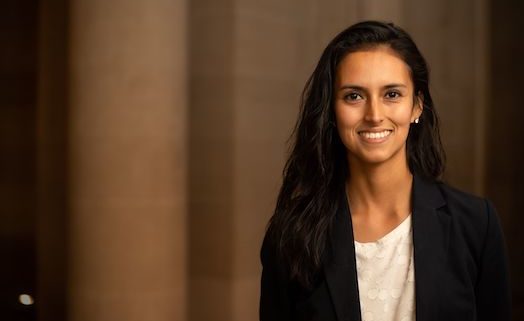News
A Democratic battle in SF’s 11th Senate District
 Jackie Fielder, candidate in the 11th Senate District. (Photo: Fielder campaign)
Jackie Fielder, candidate in the 11th Senate District. (Photo: Fielder campaign)Jackie Fielder is an activist and educator with her sights set on California’s 11th Senate District, hoping in an uphill race to topple incumbent state Sen. Scott Wiener, a fellow Democrat.
Fielder is young (25), educated (Stanford University), a person of color (both Native American and Latina), an environmental protester and an activist with a background in grassroots organizing. She describes herself as a Democratic Socialist.
Fielder, who was born in Long Beach and raised by a single mother, participated in the Standing Rock protests against the Dakota Access pipeline.
Alicia Garza, one of the founders of Black Lives Matter, chose Fielder to take over her course on race, women and class at San Francisco State University.
She has advocated for the creation of a public bank and is the co-founder of the San Francisco Public Bank Coalition. Publicly owned banks, she says, spark investment in “things that we actually need, like affordable housing, renewable energy, small businesses, and public infrastructure.”
She also worked on the No on H campaign in San Francisco, aiming to preserve the power of the city’s police oversight commission, and was soon after chosen by Alicia Garza, one of the founders of Black Lives Matter, to take over her course on race, women and class at San Francisco State University.
In the March top-two primary in a three-candidate field, Wiener captured 56 percent of the vote to Fielder’s 33 percent. It was a respectable showing for Fielder — she far outpaced the third contender, Republican Erin Smith — and it set up what could be a bruising general election.
But thus far, Wiener has a lopsided fundraising advantage. Through mid-February, Wiener reported nearly $1.1 million cash on hand, compared with Fielder’s $45,000. Wiener’s backers include an array of labor, entertainment, nursing and real estate interests.
Fielder, meanwhile, is endorsed by an impressive number of local officials — including Supervisors Dean Preston, Hillary Ronen, Matt Haney and Gordon Mar, as well as the chair of San Francisco’s Democratic Party, David Campos. She also is backed by the California Teachers Association.
Amid the pandemic, Fielder said her campaign became not only “extremely grassroots” but “extremely online.”
Their fundraising drew scrutiny after Fielder noted on May 31 that Wiener accepted $25,000 in campaign donations from law enforcement unions. He vowed to give the money to non-profit groups helping at-risk youth. Wiener then accused Fielder of accepting contributions indirectly from the San Francisco Deputy Sheriff’s Association — an allegation Fielder denied.
“Check my filings. I never received a dime from the Deputy Sheriffs or any other LEA (law enforcement agency),” she tweeted.
Fielder, who has never held elected office, describes Wiener as a “corporate Democrat” accountable only to a myriad of special interests like the real estate lobby and charter school advocates, rather than his “working constituents.”
Shortly after the March 3 primary, California went into lockdown because of the COVID-19 pandemic, and Fielder’s fledgling campaign faced the reality of conducting an election bid entirely remotely. Fielder said her campaign became not only “extremely grassroots” but “extremely online.”
Before the lockdown, Fielder says she had the help of some 800 volunteers, and those who campaign with her now do so by way of virtual phone banking.
The week before she was interviewed, she said her campaign had contacted about 4,000 voters, and the next week had called 3,000 more. But the pandemic strains a campaign that is otherwise centered on direct community engagement.
She favors the state’s response to COVID-19, particularly the stay-at-home order, but she believes state lawmakers are doing an “extreme disservice” to Californians.
Fielder says she recognizes the necessity of the stay-at-home order still in effect for California, but says if her campaign is to have any chance of winning, the restrictions must be loosened fast.
“Obviously it’s not ideal,” she said.
Nonetheless, she remains optimistic about how she stands in comparison to Wiener, a high-profile Democrat with a reputation in Sacramento as an effective legislator.
“Our opponent isn’t running a campaign, he’s legislating. And even then, the bills that he’s putting out are not speaking to renters, nonprofits, [and] small businesses, and they cater largely towards real estate and the landlord lobbies. There’s still a really good chance for November.”
And while she favors the state’s response to the crisis, particularly the stay-at-home order, she believes state lawmakers are doing an “extreme disservice” to Californians.
“For example, 74% of likely California voters support forgiving rent and mortgages. That means that our Legislature needs to be proposing measures to do just that, but they’re not,” says Fielder.
She also said the police murder of George Floyd has had a dramatic impact on the public’s perception of racial inequality.
“The protests for George Floyd are not happening in a vacuum,” she said. “The unrest is not happening in a vacuum. This is decades and generations of oppression that isn’t just explicitly tied to policing in this country but is also tied to structural inequalities.”
Want to see more stories like this? Sign up for The Roundup, the free daily newsletter about California politics from the editors of Capitol Weekly. Stay up to date on the news you need to know.
Sign up below, then look for a confirmation email in your inbox.

Leave a Reply